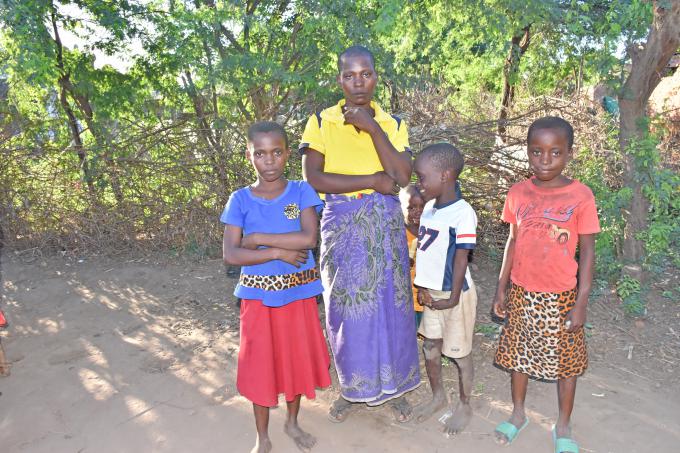Plight of the Children Impacted by Multiple Storms, Flooding
It is Tuesday evening and Esnat has just finished having her dinner together with her parents and siblings.
The normal night darkness has been abnormalized by the dark cloud that had impregnated the sky over Chikuse village in the lower-shire district of Chikwawa.

The 10-year-old Esnat goes to bed hoping to wake up the next day for school and other activities, little did she know that she will spend the next days away from her home.
Esnat took the rain drops that started falling on her roof as the normal rainfall up until around 9 O’clock when things turned haywire.
“I was asleep when my mother woke me up. I woke up and noticed that water had filled our house whose walls had started falling. Houses were demolished and all our possessions got washed away by the floods.
“I rushed to the tree which I climbed to survive. One of my siblings got washed away by the floods. I helplessly watched my sibling going down and there was nothing that we could do. I was touched and concerned to see her washed away and I am alive,” narrated the Standard 3 young girl.
“I spent the night in the tree while others stayed on the anthill all night long until the morning when we were rescued and taken to the camp. There were no boats at that time to rescue us. We only rescued a little maize which has already been finished,” she said.
That is how Esnat and her family found themselves at Chikuse evacuation camp after Tropical Cyclone Freddy devastated the area that night.
Life in the camp, she says, is not easy. More necessities such as food and clothing are lacking. After all, this is not her first time to be displaced by the floods.
“Last year I was also displaced by Tropical Storm Ana and I lived in the camp. Life has been so difficult to be in the camp every year. I did not do well last term in school. I was on position 23. This was due to the challenges that I went through,” she said.
Esnat is one of many children who have been displaced not only once, but many times in the district.
Chikwawa is one of the districts that are perennially hit hard by the floods because of its geographical location, a development which experts say affect education in the district. The district is ranked fourth worst performing district at 76.85 percent in the 2022 Primary School Leaving Certificate of Education examinations.
Chairperson for Chikuse camp, Paulo Ndamera, says about 75 percent of the children living in the camp get tempted to drop out of school because of the aftermath of the floods.
“My own child is refusing to go back to school because of persistent closures as a result of the floods. We have tried to reason with him but he says he cannot keep on getting disrupted by the floods,” he said.
Ndamera says life in the camp does not easily accommodate children's needs in education.
“It is difficult for a child who has gone through such experiences; losing property, relatives and even watching their relatives getting washed away to concentrate in class. It is even worse to get away with the trauma,” he said.
Samuel Banda, a caregiver at the camp, says that when schools are closed because of the floods, it is hard for the children to remember what they had previously learnt in class.
“It is retrogressive. Instead of thinking about lessons, children think about the tragedy and it is hard to move on. There is a case of one student who failed the Primary School Leaving Certificate of Education examinations because he was affected by the floods in 2019. The following year, he changed school to an area that is not flood prone. He did well and was selected to secondary school,” he said.
Banda added that “every child has their own living standards at their homes. It is difficult for them to change their environment because of a disaster and mix with other people from different backgrounds altogether. Opportunity to play in the camps is not there unlike at home where they are given free and safe space to play and concentrate on school.
“Some children faced a similar situation last year when Tropical Storm hit. Seven of them refused to go back to school because they could not stand the trauma. It took us to sit down and talk to them and they went back to school. They are now hit again this year by Freddy. It is not easy.”
When disasters such as this one strike, various quarters rush to support the survivors with various relief items; food and nonfood, and even cash.
Chikwawa District Social Welfare Officer, Aaron Macheka, says that “if you ask the people in the camps what kind of support they have received, they will mention soap, sugar, flour, plastic sheets and other items.
“Few of them will mention psychosocial support, yet this is the most important support that these people need because they lose their relatives and possessions and they suffer inside.”
Macheka, however, says that of all the support that government, individuals and organizations give to the survivors, Save the Children offers support that ensures that children continue playing and they are given psychosocial support.
“Save the Children with their early support helps them to settle down and children to forget the miseries they go through until they are fully settled. We need more psychosocial support,” he said.
 Malawi
Malawi